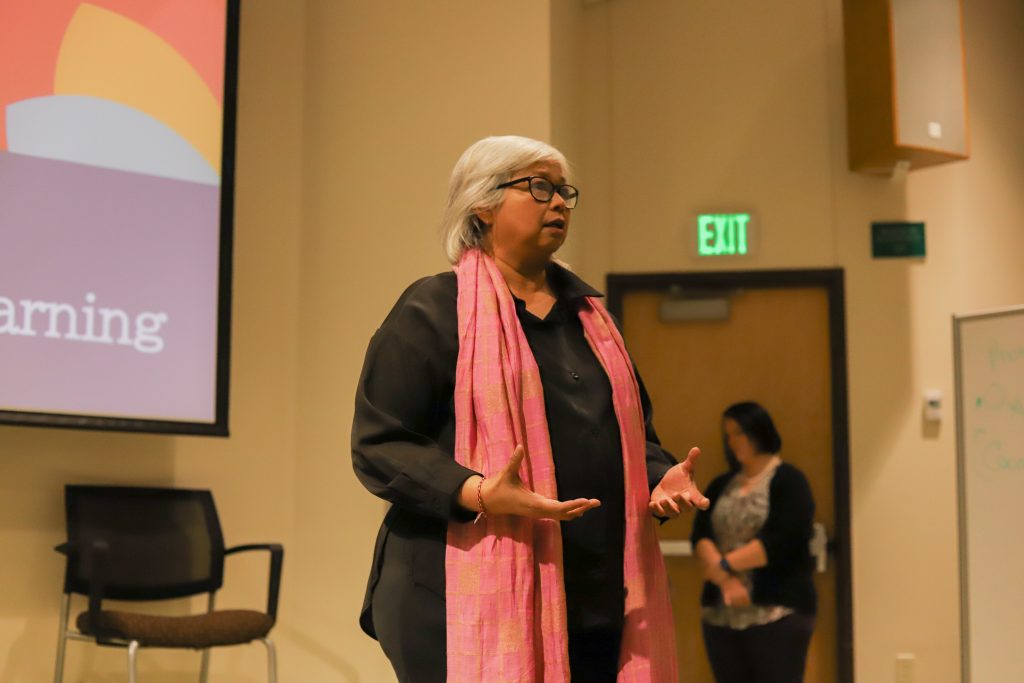Debbie Stothard, a renowned human rights activist, delivered a lecture on the Burmese military coup on Thursday.
Invited by Binghamton University’s Institute for Genocide and Mass Atrocity Prevention (I-GMAP), Stothard described how the Burmese civil rights movement has fought against dictatorship since the military coup that occurred in January 2021. She spoke as a visiting practitioner, who are activists working for mass atrocity prevention. She spoke at the Admission Center, where social science professors, I-GMAP officials and BU students gathered to learn more about human rights issues in Burma. Stothard emphasized that, though post-coup Burma has fallen into severe poverty and security issues, the younger generation has been innovative and unified in fighting for freedom and democracy.
Burma has experienced several major political events in the past few years. In October 2016, the Burmese government carried out the Rohingya Genocide, which resulted in the deaths of thousands of people and forced nearly a million refugees to flee to Bangladesh. In January 2021, the Burmese military launched a military coup to overthrow the democratically-elected civil government.
I-GMAP, over the years, has invited atrocity prevention practitioners from all over the world to visit BU and give lectures on their work. Stothard was the last lecturer for the 2022-23 academic year. Max Pensky, a co-founder and co-director of I-GMAP and a professor of philosophy at BU, opened the talk by introducing Stothard’s reputation.
“Working with I-GMAP for many years, Stothard is the founder and director of ALTSEAN-Burma, a human rights organization founded in 1996 that has advocated [for] democracy and freedom in Burma,” Pensky said. “We have admired her seriousness and outstanding courage as one of the major players in the global network resistance to the military. Her work has focused on innovative advocacy and capacity building for marginalized groups, like women and youth.”
Stothard first explained the background behind the military coup, and how its tactics have hurt the civilian population.
“Upon the risk of losing their power in the election, the military junta accused the Burmese civil government of electoral fraud and started the military coup,” Stothard said. “Young people resisted the coup as they could not accept that their limited freedom could be taken away just like that. Unable to control the situation, the junta became violent and brutal, using strategies such as burning people alive. As of January 2023, the junta has killed 2,940 civilians, burned 133 people, launched 1,370 artillery attacks and displaced over 1.5 million people.”
Stothard mentioned that as the military crushed peaceful protests, many young people joined the resistance force, known as the People’s Defence Force. Currently, the resistance controls 52 percent of Burma and has established its own government. As the situation in Burma worsens, poverty levels have risen and more Rohingya people are at risk of persecution from within and outside the country.
Despite the situation in Burma, Stothard stated that she was optimistic.
“One hopeful fact about Burma is that there is a young, open-minded generation that believes in freedom and democracy,” Stothard said. “They have run youth-led organizations to do humanitarian work and better treatment for marginalized groups. I am hopeful about their forward-thinking, passionate sentiment.”
Stothard ended with final remarks that having joy, resilience and hope were necessary forms of resistance against dictators, who want people like her to lose confidence and fear authority figures.
Shamar Barker, a senior majoring in Africana studies, shared his amazement toward the work of Burmese youth.
“I think for me it was very inspiring to see the works that youths play now in Burma,” Barker said. “It fits our generation today and also keeps me hopeful that [young people] today can fight for values while risking their lives.”
Meghan Guach, a freshman majoring in biology, shared what she took away from Stothard’s message.
“I think she was incredibly informative on what was going on,” Guach said. “I had no idea this happened before today and learned so much from her. I also liked how she explained how we could participate in the cause, which was very inspiring.”



